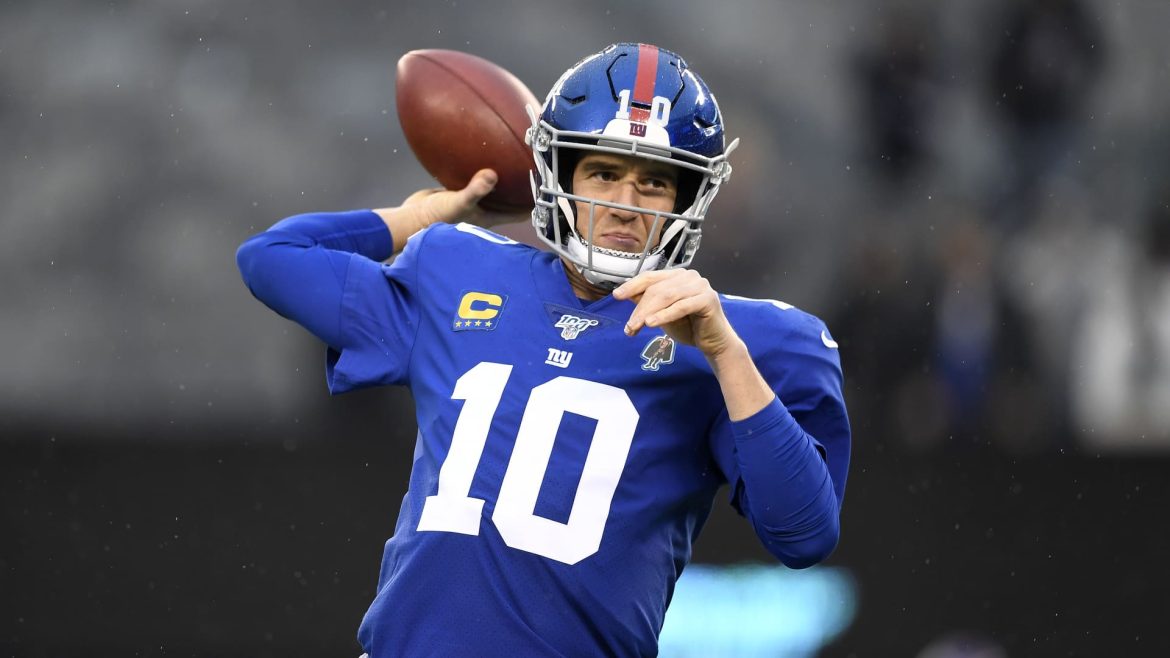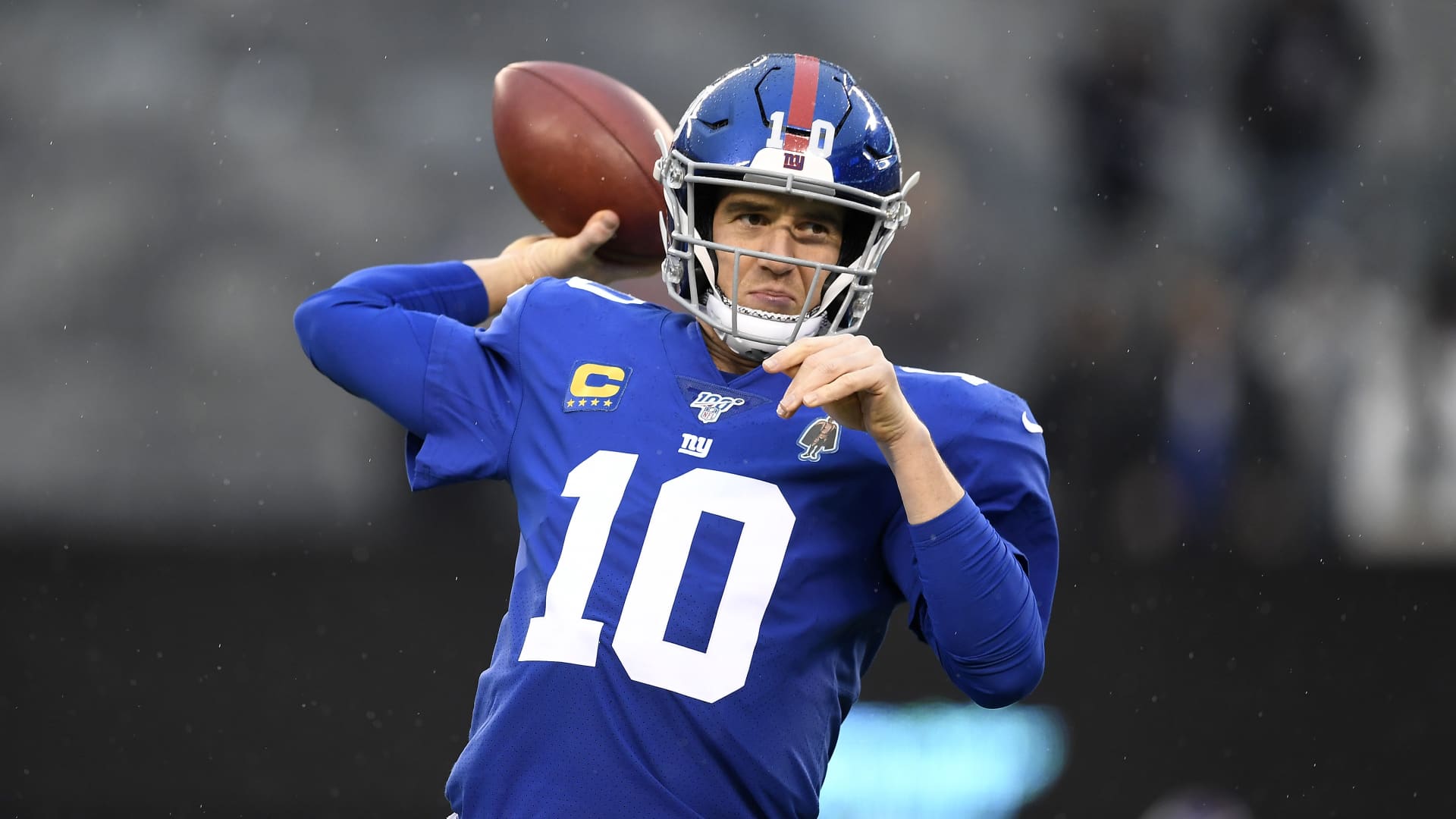Eli Manning’s career is a tapestry woven with moments of defiance, triumph, and ambition. From his controversial draft-day standoff with the San Diego Chargers to his recent, albeit short-lived, interest in purchasing a stake in the New York Giants, Manning’s journey reflects a man who has always been in control of his destiny. His decisions, both on and off the field, have shaped not only his own legacy but also the trajectory of the teams he has been associated with. This exploration of Manning’s career highlights two pivotal moments—his refusal to play for the Chargers and his ownership aspirations—that encapsulate the complexities of his character and his enduring connection to football.
The Draft Day Standoff: A Bold Move with Lasting Consequences
The 2004 NFL Draft was a turning point in Eli Manning’s career, setting the stage for a legacy that would be defined by both controversy and success. As the top quarterback prospect, Manning was expected to be selected by the San Diego Chargers, who held the first overall pick. However, behind the scenes, a dramatic negotiation was unfolding. Eli, along with his father, Archie Manning, a former NFL quarterback himself, orchestrated a plan to avoid playing for the Chargers. Their concerns centered on the team’s organizational stability, coaching staff, and track record of developing young quarterbacks. Archie’s discussions with the father of Ryan Leaf, a former Chargers draft bust, reportedly solidified their reservations about the team’s ability to nurture a young quarterback.
The Mannings’ decision to refuse to play for the Chargers was unprecedented. It challenged the traditional dynamics of the NFL draft, where players were expected to accept their fate based on the team that drafted them. The Chargers, faced with the possibility of Manning refusing to sign, were forced to trade him to the New York Giants. In exchange, the Giants sent Philip Rivers, their fourth overall pick, along with multiple draft picks, to San Diego. This trade reshaped the futures of both franchises. The Chargers acquired Rivers, who would go on to have a successful career, while the Giants secured Manning, who would lead them to two Super Bowl victories.
The draft-day standoff remains a subject of debate. Some view Manning’s decision as a bold assertion of control over his career, prioritizing long-term success over immediate gratification. Others criticize it as an act of arrogance, questioning whether a rookie should dictate the terms of his professional journey. Regardless of perspective, the event underscored the power that top quarterback prospects hold in the NFL and the lengths to which teams will go to secure their services. Manning’s refusal to play for the Chargers was a defining moment that set the tone for his career—one marked by resilience, determination, and an unwavering commitment to his own vision of success.
The Pursuit of Ownership: A Dream Deferred by Financial Realities
Fast forward to the present day, and Eli Manning has transitioned from a star quarterback to a respected figure in the NFL community. With his playing days behind him, Manning has explored various avenues, including broadcasting and endorsements. However, one ambition stood out: the desire to become part of the ownership group of the New York Giants. The prospect of Manning, a two-time Super Bowl champion and a Giants icon, joining the ownership ranks was met with widespread enthusiasm. It seemed a natural progression for a player who had become so deeply ingrained in the fabric of the Giants organization and the New York community.
Reports surfaced that Manning was actively exploring the possibility of joining a minority ownership group. The Giants were reportedly considering selling a 10 percent stake in the team, prompting Manning to express his interest. He publicly stated that he would “have interest” in being part of a group that purchased a stake in the Giants, emphasizing that he would only invest in the Giants. Manning believed that the Giants were deserving of a $10 billion valuation, a figure that reflected the team’s historical success and market value.
However, the dream of Manning becoming an owner was seemingly short-lived. Recent reports indicate that Manning has withdrawn his interest in purchasing a stake in the Giants, citing the exorbitant cost as the primary factor. In his own words, “Basically, it’s too expensive for me. These numbers are getting very big. . . . A one-percent stake of something valued at $10 billion — it turns into a very big number.” Manning’s reported net worth of $160 million, while substantial, pales in comparison to the financial requirements of NFL ownership. Even a small stake in a franchise valued at billions of dollars is a prohibitive investment for most individuals, including former players.
Manning’s withdrawal from the ownership pursuit highlights the immense financial barriers to entry in the world of NFL ownership. The high valuation of franchises, coupled with the limited availability of ownership stakes, makes it difficult for even the most successful former players to secure a position. While the dream of Manning joining the Giants ownership may be on hold for now, it is not necessarily extinguished forever. The dynamics of ownership can change over time, and future opportunities may arise that align more favorably with Manning’s financial capabilities and investment goals. The Mara family and the Tisch family, who currently own the Giants, have no interest in selling any of their shares, but circumstances can evolve, potentially opening the door for Manning to own a piece of the team in the future.
From Draft Day Drama to Ownership Aspirations: A Legacy Forged
Eli Manning’s story is one of calculated decisions, unwavering loyalty, and evolving ambitions. His draft-day refusal to play for the Chargers, while controversial, ultimately paved the way for a storied career with the Giants, marked by Super Bowl triumphs and a deep connection with the city of New York. His more recent interest in purchasing a stake in the Giants underscores his enduring commitment to the organization and his desire to remain involved in the game he loves. While the financial realities of NFL ownership may have temporarily curtailed that ambition, it is a testament to Manning’s passion and his lasting legacy that he would even consider such a significant investment.
In the end, Eli Manning’s impact extends far beyond the football field. He is a symbol of leadership, perseverance, and the pursuit of excellence, both on and off the field. Whether as a quarterback, a potential owner, or a respected figure in the NFL community, Eli Manning’s story is one that will continue to resonate with fans for years to come. His journey serves as a reminder that success is not just about talent and skill but also about the ability to make bold decisions, adapt to changing circumstances, and remain true to one’s vision of success.





